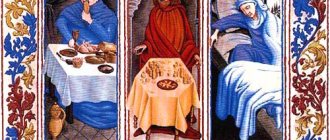What does mortal sin mean?
The list of mortal sins is the most serious sins that separate a person from the Lord. They enslave the will of a person, deprive him of grace, love for God and, if the sinner has not repented, lead the soul to destruction. Mortal sins can be compared to a stone around the neck, which prevents a person from rising to God and pulls him to the ground, preventing him from straightening up to his full height. The trauma inflicted on the soul by mortal sin becomes a serious obstacle to restoring a person’s communication with God.
What is even considered a sin? According to “Dogmatic Theology” by Archpriest Oleg Davydenkov, sin is an action, a word, a thought, a disposition of the heart, which represents a violation of the moral law established by God. Sin harms a person’s soul, represents a violation of God’s Commandments and a departure from a righteous life, from God. Sin is not a special nature or force created by God. This is a consequence of the distortion of the existence of human nature intended by the Creator.
Particularly serious sins in Christianity are called mortal sins, because their consequence is the spiritual death of the soul. She dies to God and Eternal Life. Also, the definition of “mortals” refers us to the Old Testament law, according to which the most serious sins were considered crimes and were punishable by death.
The forbidden fruit and the tempting serpent are a symbol of the Fall
How to distinguish between righteous and sinful emotions
Anger is a person’s response to some action or situation. If at this moment we are overcome by irritability, a desire for revenge, and a new conflict arises, then we should think about whether I am sinning. In the Gospel and the letter of the apostles, you can find several places where Jesus became angry when people disobeyed or violated the commandments of God. The Savior’s righteous anger differs from human anger in that during anger, people begin to hate the offender, while Christ fought with sin, but still loved the sinner.
Anger is considered a negative emotion
By expressing negative feelings towards certain events, we do not have the right to allow the devil to control us, giving him a suitable area of action. You can express your indignation in different ways, even by shouting, but at the same time, without offending the troublemaker, placing judgment in the hands of the Almighty.
Read about his sins:
- Sin of idle talk
- Sin of slander
- Sin of laziness
Important!
No matter how much Christians would like to find excuses for angry manifestations of feelings, uncontrollable actions and expressions, they will have to give an answer to God for every word and action. Being completely under the covering of the Holy Spirit, having faith in the power of God's judgment, you can learn to overcome anger while being at peace and quiet. Only God gives us the strength to look at the offender through His eyes and repay with love those who are unjust to us; only with the Lord can we get rid of mortal sin.
It is very difficult to take up your cross and follow Christ. Without humility, patience and forgiveness, it is impossible to achieve true repentance; even if we are angry justifiably, according to human concepts, we do not change anything. Seeing the speck in our brother's eye, we do not notice the beam in our own eye (Matt. 7:3).
It is easy to distinguish righteous anger from unrighteous anger using a simple test. Unrighteous emotions are directed against a specific person, and when treating a person righteously, Christians show emotions towards sin.
Deadly sins in Orthodoxy
In the Orthodox Church, the division of sins into mortal and non-mortal is quite conditional, since any sin alienates a person from God. Just as grains of sand can accumulate into stone, so small sins, if left unattended, can lead to serious and even irreversible consequences.
The list of mortal sins is not a list of specific actions, but of basic categories into which the entire multitude of crimes against God’s will can be divided. The Catholic Church practices a slightly different approach: in the doctrine of Western Christianity there is a clear and regulated division of sins according to severity.
Idleness: unnoticed sin is dangerous to life
Such a sin as idleness, so to speak, is lucky. In our strange times, he has not lost face. It is in lies, fornication, anger and many other sins that the modern world has long seen, if not the norm, then as inevitable, and idleness, in spite of everything, is still considered a vice, as it was considered. Moreover, this depravity is undeniable even for those for whom the very concept of depravity is, if not an atavism of a distant vulgarity, then certainly a convention.
Judge for yourself: will an unbelieving boss be less demanding of a lazy employee than, for example, a believer? An unbelieving wife will probably nag her slacker husband with the same fervor as a believer would. And the gossiping gossips who while away the days of their blessed old age on a bench at the entrance will, without a doubt, show no more condescension to their chronically unemployed neighbor than those who chatter about this and that during worship, sitting on a bench in the far corner of the church.
And yet, it is hardly possible to say that nothing has changed around idleness over time.
Without the opportunity to idle all day long, modern man nevertheless spends many hours in idleness, often without even noticing it. The best opportunity for this is provided by such a benefit of civilization as the Internet.
To begin with, the “classic” idle pastime is not such a common occurrence. To spend time idle, you need to at least have this time. Meanwhile, with the modern rhythm of life, such an opportunity is not available to everyone. In current conditions, even a non-family person, in order to ensure a normal standard of living, must work clearly more than eight hours a day, five days a week. And those who have a family, children, an army of relatives and, in addition, take care of elderly parents, almost universally experience a chronic lack of time as such. What kind of idleness there seems to be here.
However, today this sin has not lost its relevance at all.
Without the opportunity to idle all day long, modern man nevertheless spends many hours in idleness, often without even noticing it. The best opportunity for this is provided by such a benefit of civilization as the Internet. Take social networks, for example. By themselves, they are, of course, not dangerous. But this is provided that a person knows how to use them without harming himself. However, there are many more directly opposite examples around us.
Social media users spend long hours posting selfies, photos of restaurant food, and pictures of pets from different angles. Here they communicate and here they have irreconcilable disputes in the comments, here they while away working hours and sit all night long. It is no exaggeration to say that they live here. And sometimes even more than in reality. And of course, all these streams of photos and videos, endless online battles and just mindless scrolling of the news feed, sometimes dragging on for hours, cannot be called anything other than an idle pastime. After all, why spend hours spitting at the ceiling when you can pick up your smartphone every free minute?
Television, which is being actively replaced by the Internet, is losing ground a little, but in its current form it also provides many opportunities for wasting time. The same type of reality and talk shows, discussions throughout the country of the vicissitudes of the personal lives of celebrities, hours-long programs about politics, viewing of which instills in the viewer firm confidence in their own political literacy and social significance, plotless long-running series... The benefits of watching this kind of show are about the same , as if the time spent on them could be thrown away.
Television, which is being actively replaced by the Internet, is losing ground a little, but in its current form it also provides many opportunities for wasting time.
If any of us are not guilty of vegetating on the networks or being addicted to television, wait a moment to breathe a sigh of relief. And without the Internet and television there are enough opportunities to waste time. For example, a fashionable activity these days is shopping.
Shopping usually takes place over a long period of time, sometimes with a clear shopping plan, sometimes without it, and sometimes completely aimless, but always accompanied by the desire to plunge headlong into the simple process of walking, looking, purchasing. Of course, after such a pastime, the result remains in the form of purchases, however, no matter how many there are and no matter how necessary they are in the household, if three or four times more time is spent on purchasing them than is actually necessary, then there is no more idle task It's worth looking for.
Of course, there is not the slightest doubt that all of the above is nothing more than activities for short periods of time. Doing something like this, for example, for days on end, is difficult to say the least. However, a skill is developed not so much by duration as by regularity of action. And in this regard, even a couple of wasted hours a day is enough to form a vicious habit of idleness.
Over time, the desire to spend time idle will only grow, and the strength and desire to counteract this desire will become less and less. The result will naturally be deplorable: a person accustomed to idleness will cease to value time. Having gone online for five minutes, he can easily spend half a day looking at unnecessary messages or communicating in the messenger; any serious work will be beyond his strength; his main qualities will be laxity, lack of self-discipline, irresponsibility, and unreliability. It is hardly worth talking about the life prospects of such a person because of their unenviable obviousness. There is no point in talking about spiritual life at all, since it requires much more determination, composure, consistency and action than worldly life.
Therefore, the conclusion is simple: you need to learn not to waste an hour or a minute, since the worst is the beginning, and a wasted hour opens up the sad prospect of a life lived in vain.
List of deadly sins
How many mortal sins are there in Orthodoxy? Having familiarized ourselves with the works of the Holy Fathers, we can find out that the most common number of mortal sins is 7.
1) Pride (pride, pride, arrogance, vanity, stubbornness)
2) Envy (annoyance at someone else’s well-being, gloating at other people’s misfortunes)
3) Gluttony (gluttony, drunkenness)
4) Fornication (lust, adultery, intimacy before marriage, sodomy, masturbation)
5) Anger (hatred, insults, insults, cruelty, assault)
6) Greed (greed, stinginess, love of money)
7) Dejection (loss of hope in God, melancholy, sadness, despair)
Types of manifestations of anger
The love of self-righteousness and self-correctness often leads to arguments that end in conflicts and quarrels. With a great desire for self-affirmation, instead of a constructive dispute, a duel arises, stroking one’s pride. In the absence of demonstrative arguments, insults and insults are used, people start shouting, losing the appearance of Christians.
According to Ephraim the Syrian, the first one who repents in the heat of a quarrel is covered with a crown of victory; the second one will also be blessed if he manages to accept repentance.
Anger can manifest itself as irritability, short temper, hatred
Resentment and resentment in itself are already a sin, because at the same time there is no forgiveness and humility. The inability to let go of a grudge and harbor evil is like acid, corroding the soul from the inside. The resentment that gives rise to angry emotions primarily harms ourselves. Sometimes the offender whom we hate has long forgotten about the argument, the problematic situation, lives in joy, and we carry this bag of grievances and anger, breaking our hearts.
Anger is a sharp weapon with both ends sharp; when defeated, it is the one who is offended who suffers the stress first. If you want to be healthy physically and psychologically, goodbye.
Conventionality of the concept of “mortal sin”
It should be remembered that the list of mortal sins in Orthodoxy is conventional. Any sin is a threat and requires repentance. And any sin can be forgiven by God. Mortal is the sin that remains unrepentant. The Lord will accept and forgive the repentant sinner.
The Monk Paisius the Svyatogorets said that the devil does not have any power or authority over a believer who goes to Church, confesses, and takes communion. In the sacraments of Confession and Communion, God gives a person strength to fight passions. The Lord is All-Merciful, and His mercy is limitless. He does not have the task of necessarily punishing a person for the slightest deviation from the letter of the Law.
Let us quote the words of St. Ephraim the Syrian:
“The door of God is always open to him who strikes it; mercy rejoices at the one who turns, goodness stretches out its hands to him.”
Getting rid of passions: 7 virtues
Saint Ignatius Brianchaninov in his works gives step-by-step instructions for getting rid of passions. He reveals to us what virtue is the opposite of passion, and how with its help one can overcome sins.
Here are seven virtues opposite to passions:
- Humility . Awareness of one’s insignificance, fear of God, fear of punishment for sins, change in attitude towards others, awareness of oneself as worse than them, dislike of praise, avoidance of worldly glory, obedience in everything to the Church and its servants, simplicity, silence, seeing one’s sins and passions, desire to fight with them, accepting criticism, not trying to justify themselves to people, silently and meekly enduring insults, unwillingness to take revenge for one’s insults, forgiving insults.
- Non-covetousness . Satisfaction with what you have, not wanting to be rich, giving your wealth to the poor, charity.
- Chastity . Maintaining physical and mental purity. Disgust from prodigal books, images, films, etc. Removal from ambiguous conversations and flirting. Loyalty to your spouse until death. Keeping your hearing, your heart from your thoughts, your sight. Modesty in dress, words and thoughts. Serving the sick. The saint calls the end of chastity the purity that sees God.
- Blessed lamentation for one's sins . Contentment with what the Lord has given. Thanks be to God. Willingness to endure whatever God sends.
- Abstinence in food and drink . Sobriety, fasting, avoiding unnecessary meals, reducing the amount of food taken.
- Sobriety . Some people think that the antagonism of despondency is joy and cheerfulness. However, the saint believes that there is nothing particularly special for an Orthodox Christian to rejoice at. Even Saint Anthony, when the demons said to him: “Rejoice,” replied that he was unworthy of this feeling, because he was a sinner. Should we indulge in insane joy?! Every Christian always has a lot of work to do on himself, a lot of sorrows. And you can resist despondency only by sobriety over your soul, attention to the thoughts and movements of the soul. Some people misunderstand and interpret the words of the Savior: “rejoice and be glad,” but He spoke about the Heavenly reward, which we still need to earn. These words were spoken at the end of the Beatitudes. Consequently, the one who fulfills all these commandments may ultimately be rewarded with another, Heavenly joy from God. But even this should not be desired and sought, as the saints say, otherwise one can fall into delusion - a dangerous spiritual state. Sobriety includes being attentive to prayer, reducing the amount of sleep, increasing the number of bows and time spent in prayer.
- Meekness, kindness , unwillingness to avenge oneself, polite and even attitude towards everyone. Patience, kindness, peace of mind.
Every Christian has a lot of work to do on himself, his soul, if, of course, he wants to be worthy of the Kingdom of Heaven. But one should not despair; one must hope for God’s help, which is certainly given to those who want to be saved. After all, the Lord wants our salvation even more than we ourselves. Therefore, we must turn to Him for help, but also not be lazy, make efforts. “The Kingdom of God is in need,” this means that only the diligent and diligent enter into It, and not the lazy and relaxed. Any sin can be overcome by repentance, as the saints say.
prot. Andrey Tkachev about the sins of death










